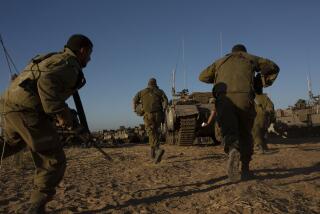Passivity of Iraq’s Forces Was Calculated : Strategy: Hussein had to be able to put down postwar uprisings and refrain from provoking the U.S. into marching on Baghdad.
- Share via
The profound passivity of Iraq’s military forces during Operation Desert Storm remains a mystery. Other than firing a few Scud missiles and launching a small-scale ground attack against the Saudi coastal town of Khafji, Iraqi forces in the Kuwaiti theater remained virtually inert during the 38 days of round-the-clock U.S. and allied air attacks. Iraqi troops simply waited to be encircled or overrun.
Conventional wisdom has it that Iraq’s comatose military behavior was induced by the coalition air campaign itself, that Iraqi forces in Kuwait--and the chain of command linking them to Baghdad--were so quickly and thoroughly paralyzed by the coalition’s air blitz that the Iraqi army simply could not function coherently.
The Desert Storm air campaign unquestionably disrupted Iraqi military communications and wreaked destruction on Hussein’s units in Kuwait. Never has a field army been so physically and psychologically pulverized by air power alone.
But this explanation for Iraqi passivity seems incomplete. Among other things, it does not explain a number of other Iraqi “surprises.”
Surprise No. 1 was the absence of any significant terrorist attacks against Americans and American property abroad, despite Saddam Hussein’s repeated threats.
No less surprising was the absence of chemical attacks on coalition forces. Stocks of chemical artillery shells were deployed with Iraqi forces in Kuwait, but not a single one was fired.
A third surprise was Iraq’s relatively mild treatment of American and allied prisoners of war. To be sure, the first captured airmen were abused and exhibited on Iraqi television. However, according to postwar accounts of released POWs, abuse quickly gave way to reasonable care.
There was also the mysterious flight to Iran of more than 120 of Iraq’s best war planes and the apparent attempt by the navy’s remaining vessels to dash to Iran.
Finally, there was, with the noted exceptions of SCUDs and at Khafji, no offensive ground or air action. The Iraqi air force did not attempt a single sortie against the huge Saudi air bases and port facilities, which were so indispensable to the coalition; and at no time did the Iraqi army display one iota of the ferocity it subsequently visited on the rebellious Kurds and Shiites toward coalition ground forces.
Iraq’s zombie-like performance, I believe, was attributable to something more than the air campaign--namely, Hussein’s determination to preserve his grip on power at any price. It is quite possible that shortly before, during or after the beginning of the air war on Jan. 16, Hussein recognized the hopelessness of his position in Kuwait and decided to write off most of his forces there. Far more important to the megalomaniacal dictator was his personal and political survival--a goal for which in the past he had demonstrated a readiness to sacrifice important state interests and any number of his own people.
However, once the war began, Hussein had to do two things to have any real chance of preserving his regime intact: He had to preserve as much of his military power as possible to defend his regime against inevitable postwar Kurdish and Shiite uprisings. Second, he had to refrain from taking any actions that might provoke the U.S.-led coalition to go beyond the U.N. mandate of liberating Kuwait. He could cut his losses in Kuwait, but he could not tolerate a U.S. advance on Baghdad, which might have prompted a coup.
A desire to husband as much of his military power as possible could explain the attempted transfer of Iraqi warplanes and ships to neutral Iranian bases, in the hope that the Iranians would return them when the war was over.
That strategy may also explain the Iraqi army’s lethargy. Offensive ground action requires a great deal of movement, and almost anything Iraqi that moved on the ground was promptly attacked by coalition air power. As high as Iraqi casualties in Kuwait were, they would have been much higher if Hussein’s forces had moved out of their fortified defensive positions.
Keeping the Americans from marching to Baghdad meant refraining from behavior that might incite them to abandon U.N.-imposed political limits on Desert Storm. Clearly, blowing up American innocents abroad, hosing down U.S. forces in Saudi Arabia with poison gas and torturing and murdering American POWs would have inflamed American public opinion and could have provoked President Bush into issuing an on-to-Baghdad order.
All of this is, of course, highly speculative. But the proposition that Hussein’s wartime behavior was motivated primarily by a desperate determination to save himself and his regime, rather than military considerations pertinent to Kuwait’s defense, goes a lot farther than any other in explaining the absence of terrorist and chemical attacks, and of significant offensive ground action; the attempted transfer to Iran of Iraqi planes and warships; and the unexpectedly mild treatment of all but the first few coalition POWs.
The irony is that, unlike Hitler, who brought himself, his regime and his country to utter ruin because he could never bring himself to cut his losses, Saddam Hussein has indeed saved himself and his regime, and may well live on to fight another day.
More to Read
Sign up for Essential California
The most important California stories and recommendations in your inbox every morning.
You may occasionally receive promotional content from the Los Angeles Times.










